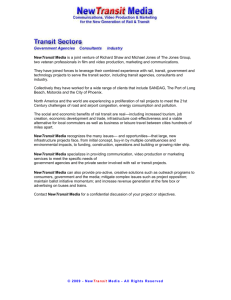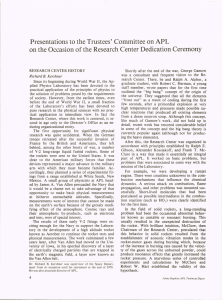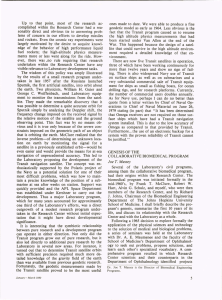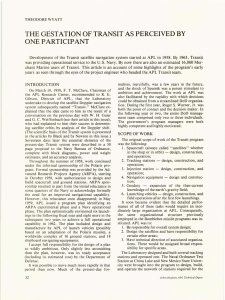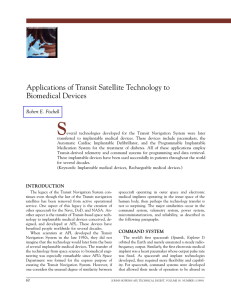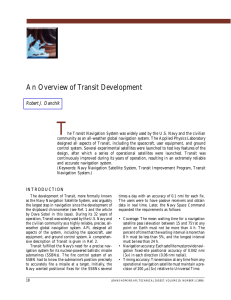GUEST EDITORIAL Di est g
advertisement
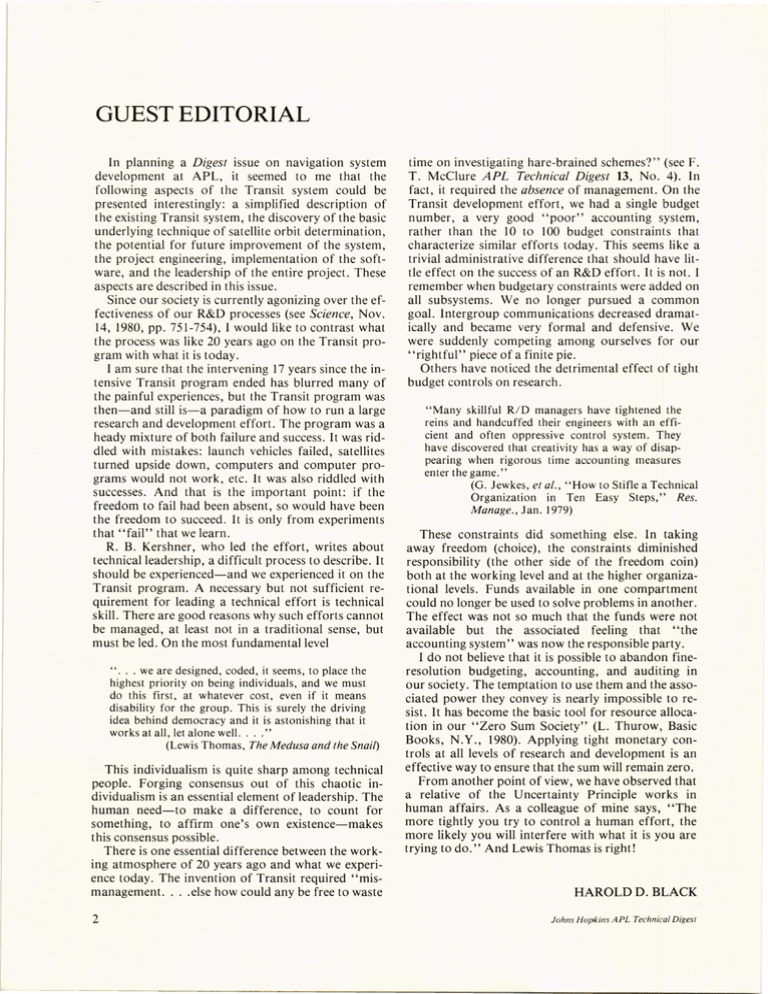
GUEST EDITORIAL In planning a Digest issue on navigation system development at APL, it seemed to me that the following aspects of the Transit system could be presented interestingly: a simplified description of the existing Transit system, the discovery of the basic underlying technique of satellite orbit determination, the potential for future improvement of the system, the project engineering, implementation of the software, and the leadership of the entire project. These aspects are described in this issue. Since our society is currently agonizing over the effectiveness of our R&D processes (see Science, Nov. 14, 1980, pp. 751-754), I would like to contrast what the process was like 20 years ago on the Transit program with what it is today. I am sure that the intervening 17 years since the intensive Transit program ended has blurred many of the painful experiences, but the Transit program was then-and still is-a paradigm of how to run a large research and development effort. The program was a heady mixture of both failure and success. It was riddled with mistakes: launch vehicles failed, satellites turned upside down, computers and computer programs would not work , etc. It was also riddled with successes. And that is the important point: if the freedom to fail had been absent, so would have been the freedom to succeed. It is only from experiments that "fail" that we learn. R. B. Kershner, who led the effort, writes about technical leadership, a difficult process to describe. It should be experienced-and we experienced it on the Transit program. A necessary but not sufficient requirement for leading a technical effort is technical skill. There are good reasons why such efforts cannot be managed, at least not in a traditional sense, but must be led. On the most fundamental level " ... we are designed, coded, it seems, to place the highest priority on being individuals, and we must do this first , at whatever cost, even if it means disability for the group. This is surely the driving idea behind democracy and it is astonishing that it works at all, let alone well. ... " (Lewis Thomas, The Medusa and the Snail) This individualism is quite sharp among technical people. Forging consensus out of this chaotic individualism is an essential element of leadership. The human need-to make a difference, to count for something, to affirm one ' s own existence-makes this consensus possible. There is one essential difference between the working atmosphere of 20 years ago and what we experience today. The invention of Transit required "mismanagement. ... else how could any be free to waste 2 time on investigating hare-brained schemes?" (see F. T . McClure APL Technical Digest 13, No.4). In fact, it required the absence of management. On the Transit development effort, we had a single budget number, a very good "poor" accounting system, rather than the 10 to 100 budget constraints that characterize similar efforts today. This seems like a trivial administrative difference that should have little effect on the success of an R&D effort. It is not. I remember when budgetary constraints were added on all subsystems. We no longer pursued a common goal. Intergroup communications decreased dramatically and became very formal and defensive. We were suddenly competing among ourselves for our "rightful" piece of a finite pie. Others have noticed the detrimental effect of tight budget controls on research. "Many skillful RI D managers have tightened the reins and handcuffed their engineers with an efficient and often oppressive control system. They have discovered that creativity has a way of di sappearing when rigorous time accounting measures enter the game." (G. Jewkes, el at., "How to Stifle a Technical Organization in Ten Easy Steps," Res. Manage., Jan. 1979) These constraints did something else. In taking away freedom (choice), the constraints diminished responsibility (the other side of the freedom coin) both at the working level and at the higher organizational levels. Funds available in one compartment could no longer be used to solve problems in another. The effect was not so much that the funds were not availabie but the associated feeling that "the accounting system" was now the responsible party. I do not believe that it is possible to abandon fineresolution budgeting, accounting, and auditing in our society. The temptation to use them and the associated power they convey is nearly impossible to resist. It has become the basic tool for resource allocation in our "Zero Sum Society" (L. Thurow , Basic Books, N.Y., 1980). Applying tight monetary controls at all levels of research and development is an effective way to ensure that the sum will remain zero. From another point of view, we have observed that a relative of the Uncertainty Principle works in human affairs. As a colleague of mine says, "The more tightly you try to control a human effort, the more likely you will interfere with what it is you are trying to do." And Lewis Thomas is right! HAROLD D. BLACK Johns Hopkins A PL Technical Digest

